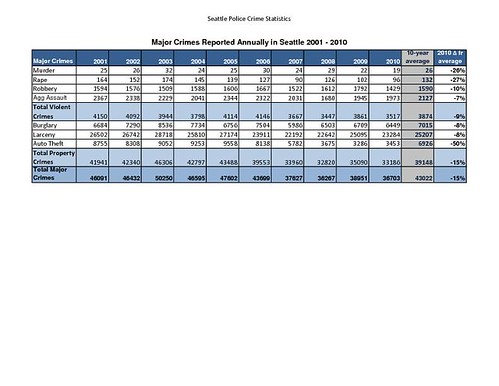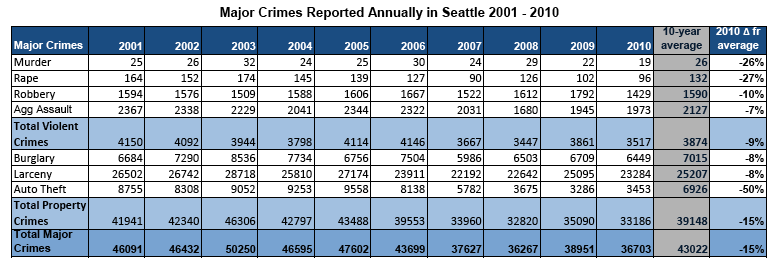A report commissioned by the Seattle Police Department says that the rate of complaints related to the use of force by officers in the city is well below national averages and is trending lower.
The just-released report comes in the wake of a seemingly violent 2010 for SPD including the shooting death of JT Williams. 2010 statistics were not included in the report which was completed this summer before the shooting but not immediately released. The Justice Department is also currently investigating the department.
Here are summaries of the two findings and the entire report is embedded below.
- The rate of complaints about SPD officers’ use of force is well below the national norm. The national use of force complaint rate for large, metropolitan police agencies is 9.5 complaints per 100 full-time officers.8 The comparable rate for SPD officers was 5.3 complaints per 100 officers, which is 44% lower than the national rate for metropolitan agencies and 20% below the complaint rate in law enforcement agencies of any size.
- The number of SPD officers receiving use of force complaints has dropped steadily since 2007. In 2007, 111 SPD officers received one use of force complaint. This number dropped to 98 officers in 2008 and to 72 officers in 2009. The number of officers receiving two force-related complaints within a single year has dropped from 11 officers in 2007, to 7 officers in 2008 and down to 5 officers in 2009. There were two officers with three or more use of force complaints in 2007. This number went up to seven in 2008, but dropped again to two officers with three or more complaints in 2009.
UPDATE: SPD has also released its 2010 crime totals. We’ve attached the full PDF report and will follow up with a look at the 2010 Capitol Hill area totals soon.
Here is SPD’s summary on the 2010 citywide crime stats:
Through December, Major Crimes were down citywide by 6% when compared with the 2009. The citywide crime trend in 2010 was different from that in 2009. By the end of 2009, there had been citywide increases in both Violent Crimes and Property Crimes. As of the end of 2010, Violent Crimes were down by 9% compared with 2009, led by a 20% decrease in robberies. Property Crimes were down by 5% across the City, with a slight increase only in vehicle thefts.
Adjusted for population, the crime rate per 1000 in 2010 was the lowest since 1967. The City also had the fewest homicides since 1956.






I’m pretty critical of police, generally, but it seems to me that SPD have been a model of restraint during the various street nonsense following the Birk inquest. (By “nonsense” I don’t mean legitimate, peaceful protest, but the handful of people that use it as a cover for vandalism.) I’d bet that there aren’t many metro precincts in the country that would put up with a crowd facing off around their building with riot police and not arrest anyone.
Okay, so the rate of complaints about police use of force is dropping. Does that mean there’s less abuse happening, or that we’re more accepting of, and less likely to complain about, police abuse? In the past decade, Americans have become drastically more accepting of police-state-style actions on the part of our government staff, from the federal level all the way down to local law enforcement.
Our typical image of police has gone from the friendly officer in blue who lives in our town and maintains the peace to that of black-clad, paramilitary style cops cruising around in SUVs and muscle cars (of course they’re not *all* that way, but not too long ago, *none* of them was like that). I think that change in image, alone, is likely to reduce the number of complaints about use of force. Nowadays, people *expect* police officers to be hyperaggressive roid-heads. “Oh, another ACT officer blew his top and roughed somebody up? Ho, hum. The perp probably deserved it.”
By comparison, consider what it takes to get people to complain about government abuse at airports nowadays. If I’d told people five years ago that government staff would soon require us to let them either look under our clothing or lift our breasts and feel our scrotums in order to get on an airplane, people would have told me I was crazy. But here we are, doing just that, and most people don’t complain. “Anything for safety.”
Why would anyone file a use of force report against the SPD? If you do, you immediately get charged by the KC prosecutor for assaulting an officer, and the officer is guaranteed to go unpunished.
Dave, that’s new to me. Can you provide some examples?
I would like to see data to back up your hogwash statement. Please.
Here’s some examples of what I’m talking about. One thing I forgot to mention in the pattern – first a cop uses beats down an innocent civilian, then they are arrested for assaulting and officer, then the police spokesperson releases information on any crime, not matter how small, the victim committed in the past (even if the victim is a minor), then the KC prosecutor prosecutes. The cop goes unpunished.
Here are some examples – Maikoiyo Alley-Barnes – http://seattletimes.nwsource.com/html/localnews/2004032283_a
DV One – http://www.seattlepi.com/jamieson/286248_robert23.html
teenage kid beaten by cop in Belltown – http://www.kirotv.com/news/25834713/detail.html
there are many more. It’s a pattern, an obvious one. In two of the above cases the cops have been proven to be on the wrong side. In the case of Alley-Barnes they even had to pay the victim. I’m sure the same will happen with the 19 year old in Belltown the officer kicked, and the KC Prosecutor then pressed charges against – read the whole story.
The bummer is that I bet about only 5% of cops get 99% of the complaints. I work with the Police a lot, and all the ones I work with seem great. Unfortunately the SPOG throws the 95% of the good cops under the bus by defending the obvious bad ones. This makes the good cops difficult job even tougher because the public is losing trust in all cops.
Not that I necessarily disagree with any point you are attempting to make, but those are some awfully big claims to be made without providing anything substantive to back them up. Give us something more than opinion couched as fact — I’d be curious to learn more.
Dang: Which claims that I made do you doubt the accuracy of? That people are more accepting of police-state-style actions in the United States than we once were? That the image of our police officers has gone from the friendly constable to machismo-filled SWAT team members that you better not look at wrong or they’ll beat you and accuse you of things you did not do — maybe shoot you in the back and walk away without even being prosecuted? That federal airport security guards use machines to look under people’s clothing, or alternatively, perform law-enforcement-style body searches, as a condition of getting on a commercial airline? That people are barely complaining about all of this?
You’re asking me to back claims about things that are readily obvious to me. I don’t know where to start.
Dave, thanks for providing examples. I suspect many people reading this were unaware of those situations.
Now, what can we do about it?
Phil – the solution is very simple, and very difficult. The officers need to reform their union. The SPOG is doing them more harm than good right now. SPOG has been great at getting more pay, by tying any concession on discipline or oversight to more money. This isn’t sustainable long term, and it’s resulting in a system where the small minority of bad cops get rewarded while the good cops get treated badly by the public as a result. They need new SPOG leadership, and they need to stop viewing the government that pay them and the community they work for as the enemy. It’s crucial we have Police, and that they are respected, but they need to earn that respect. It’s a two sided coin.
Dave: I completely agree. If you come upon a project working toward that reform in need of participants who are not police, please get in touch.
Phil: Readily obvious to you perhaps, but that in itself does not mean it isn’t hyperbole.
I don’t think your example regarding airport security is accurate. Far from accepting invasive searches, there are organized protests to avoid full-body scanners that have forced TSA to rethink how scans are conducted. Pat-downs? Look no further than the Alaskan congress women opting to take a much publicized long trip home aboard ferries, cars, etc to avoid pat-downs at the airport.
And where is the friendly constable image derived? Mayberry? Perhaps it’s a matter of where I grew up, but that image never existed among my acquaintances and me. The “examples” you cite regarding hyper-aggressive cops are no more extreme than abuses that occurred in the South in the civil rights era or any inner city neighborhood in the 80s. And if you dig deeper, you’ll find more histories of abuse of power.
But, that’s not the point I’m interested in learning about. What I want to know is this, is the complaisance and resignation you claim see today really more prevalent than any other time in our country’s history? If so, there should be some measure of proof that this is the case, via something you’ve read, some statistics you perused, research you conducted or experiences you’ve had that gives you a broad-based sampling to derive the claims you make.
Without that, you’re simply opining based on a very narrow, select sampling. If it’s obvious then providing something to substantiate your “facts” should be straightforward.
I’m opining based on a somewhat narrow sampling. Maybe people’s view of police hasn’t changed so much. Maybe complaints are down because, as Meinert suggests below, they rarely go anywhere. Maybe they’re down because SPD staff’s behavior has improved. I don’t claim to know; I’m just guessing.
Re: TSA push-back, yes, the naked scans and groping straws have finally broken a few camel’s backs. I was at Sea-Tac the day before Thanksgiving last year with a handful of other people hading out brochures about the strip search machines and about your rights at the airport (I made that one myself). But that push-back is relatively small, given the extent of what’s going on at airports, and it was almost nonexistent until last fall.